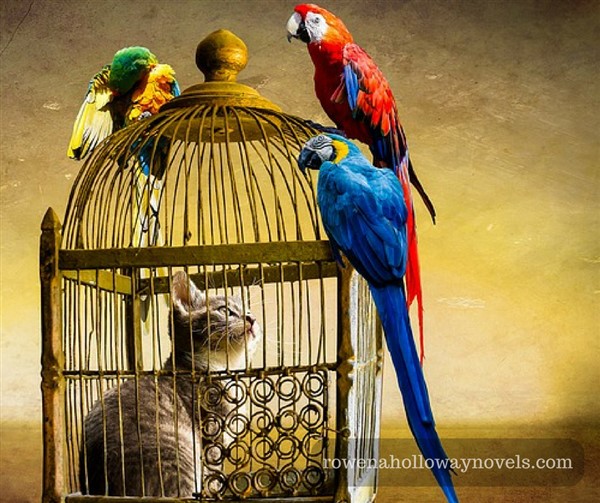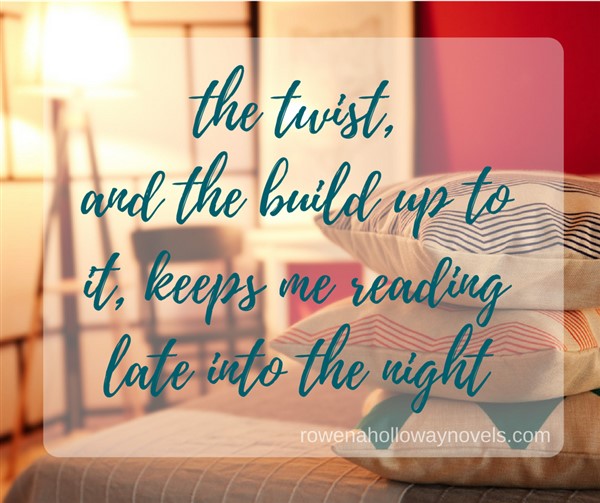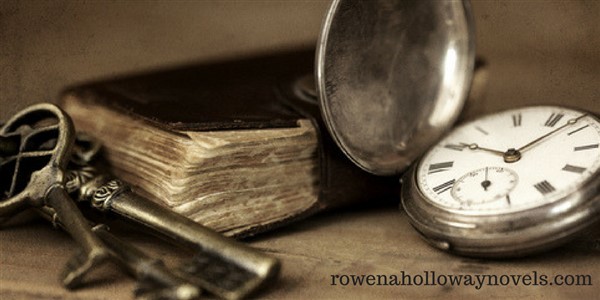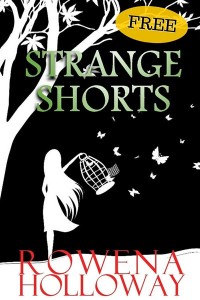Our history begins before we are born. We represent the hereditary influences of our race, and our ancestors virtually live in us.
James Nasmyth
Late last year I ran a quick survey with my email subscribers–all avid readers who love suspense. When the answers came back I was thrilled to discover what they love most about a book is a twist in the tale.
As a reader I wholeheartedly agree; the twist and the build up to it keeps me reading late into the night. It’s also the most likely reason I’m not a morning person.
The reason I was thrilled was because that’s also what I love writing. I like to keep you guessing, to draw you in and grip you until the very end.
 There are points in the story where adding a plot reversal or a surprising revelation can really ramp up the tension, but it’s once I find that all important final twist—one that challenges my main character’s beliefs about her world and, hopefully, casts a different light on everything you, as a reader, understand about the story—that’s when I know I’m there.
There are points in the story where adding a plot reversal or a surprising revelation can really ramp up the tension, but it’s once I find that all important final twist—one that challenges my main character’s beliefs about her world and, hopefully, casts a different light on everything you, as a reader, understand about the story—that’s when I know I’m there.
Usually that’s also when I have to go back and pepper in a few clues so that the truth comes as a surprise and yet makes perfect sense.
This is great fun in a story. But what happens when that happens in your own life?
A Real Life Twist
It has happened to me–in a small kind of way. I didn’t find out I was adopted or stolen at birth or the daughter of a mass murderer (thank goodness!). I did discover that something I had invested in my entire life was untrue.
At author talks I’ve been asked why I like to mess with my character’s beliefs, and it hasn’t been an easy question to answer. Sure, it makes for a great story yet it’s more than that. It’s also what comes up whenever I start working through the plot and developing my character’s goals and backstory.
It’s taken me a few years to realise…
what I choose to write is very much about my identity.
Life as a Reader
Long before I was a writer, I was a reader. At school I was last to be picked for sports but always first in line at the library. When a teacher once sent me to the library to look up a word I didn’t know how to spell I didn’t care that it caused me to miss most of that lesson—I was in the library. With books. By myself! Awesome. Long before it was cool, I was a nerd and I didn’t care. I read everything: Asterix, Lord of the Rings, James Clavell’s Shogun (which I finished in one night reading with a torch under my covers). I loved ghost stories, Barbara Cartland and mysteries.
Then I discovered crime: Patricia Cornwall, Dorothy L Sayers, Tami Hoag and Robert Goddard.
 Wanting to Write Crime
Wanting to Write Crime
Naturally, when I decided to pursue writing as a career, I figured I’d write crime. I had the germ of an idea about a missing friend and I had the passion and determination to make it happen. After a few false starts and misdirections I had a few hundred pages of story, which was when I realised I hadn’t written a story about a crime at all.
The mystery was still there—a cold case story about a skeleton found deep in an abyss on the Amalfi coast—but equally prevalent was a story about family relationships and dysfunction.
Huh? I hadn’t set out to write women’s fiction—back then I don’t think that term yet existed—but that’s what I had.
Staying True to The Story
Where did this other story come from? The main character Harriet had a difficult relationship with her mother and it is her desire to resolve that which sends her off to Italy to look for her mother’s missing friend. Somehow the mother/daughter subplot had asserted itself and the mystery had become more of a vehicle to move that story forward rather than the other way around as I had intended.
The book I’m talking about is All That’s Left Unsaid. It was the first novel I wrote—and re-wrote several times over—but the second one to be published. I held back because I lacked confidence about this mix of women’s fiction and cold-case mystery.
Staying True to Myself
Over the last couple of years I have reflected upon what I write and whether I should focus on traditional who-dunnit crime story with a body on the first page and detail the investigation. After all, if I want to make this a career I need to be writing what publishers relate to. The problem is that I don’t have the passion for a police procedural. I like to explore family dynamics, especially when that family has had to live with the fall out of a crime.
Fractured Families, Killer Secrets
 My experiences have led me to believe secrets, especially family secrets, go to the heart of our identity. We understand who we are through the stories passed down around the dinner table.
My experiences have led me to believe secrets, especially family secrets, go to the heart of our identity. We understand who we are through the stories passed down around the dinner table.
If, like me, you are a fan of Who Do You Think You Are?, this is a concept that often strikes the participant. Actors are thrilled to discover the stage features in the lives of their ancestors, musicians suddenly understand where their passion comes from, and sometimes someone discovers their family were murderers, convicts or slave owners and they question what they understand about themselves.
Stories of our ancestors aren’t all we are, but for me they were a big part of how I developed my sense of self.
A First-Generation Aussie
My parents came to Australia from the UK in the mid-sixties, part of a skilled migration initiative overseen by the Menzies Government. They had no other relatives in Australia and it wasn’t until my very early teens, when we returned to the UK for an entire wintry year (something I was not pleased about), that I mingled with my aunts, uncles and cousins.
Because of my parent’s migration to Australia the only family stories shared with any regularity came filtered through Mum and Dad. Mum often talked of ‘missing my friend Jacquie’ (which was the germ that led to All That’s Left Unsaid). And Dad used to tell tales about Great Grandpa Chip.
For years I thought his name was Jepp, but Dad assures me it is Chip.
Great Grandpa Chip
Now Great Grandpa Chip was a pretty cool relative. He lived in Cornwall on a windswept cliff in a mansion that contained—wait for it—a secret passage down to smugglers caves.
You can imagine how exciting that was to a young girl obsessed with ghosts, mysteries and Barbara Cartland. I loved it. As I grew older I embraced everything Celtic: runes, Wiccan, All Hallows Eve—you name it, I was into it.
Later, I learned the Spanish had invaded Cornwall. Another piece of the identity puzzle dropped into place. I may be of English heritage, but with dark hair and eyes and olive skin I’m no English Rose. I figured I must be a throwback to my Cornish ancestry. A belief supported when my husband and I travelled to Spain. Physically, I fit right in. I even found a portrait in the Prado of a woman who looked spookily like me.
The Twist in the Tale
Just a few years ago, we were all sitting around the dinner table in a food-induced Christmas stupor and most of the kids had gone off to do their own thing, when Dad casually dropped a bombshell…
Great Grandpa Chip wasn’t a blood relative.
What the …?
I was devastated. If I’m not related by blood to Great Grandpa Chip and the Cornish heritage of paganism, smugglers coves and windswept mansions, who am I? Where do I fit?
It doesn’t seem like a big deal, but I remember being stunned and for a while I floundered over this new piece of knowledge.
All About the Twist
I guess that’s why I like to shake my characters up. I let them discover truths that unsettle their entire history and then watch the drama unfold.
The best stories hook us in, gets under our skin, and keeps us intrigued until the very last word. That’s what I love to read; that’s what I enjoy writing. So I am thrilled that a pacey story with a killer twist is also your favourite type of suspense.
I pride myself on writing pacey, emotive suspense. Once I’ve written the story and am happy with how it hangs together that’s when I take the red editing pen out and cut away all the extraneous story lines, the loose ends that can’t be tied up, the sentences or clues that don’t work, the conversations that don’t move the story forward no matter how much I may love them.
This process can be painful and time consuming and often filled with angst, but you can’t beat that feeling when the story is finally freed from all that extra padding. In a way, I guess, I’m rewriting my character’s story around those cut away pieces just as I’ve had to rewrite mine in the absence of my presumed lineage.


So, what draws you into a story? What keeps you reading? And what most turns you off and makes you stop reading?
Leave a reply in the comments below. I love to hear from you.
If you enjoyed this story, why not join my suspense community? I share with you my favourite books, latest news and reviews, and each newsletter includes an article about writing, reading or the inspiration behind one of my novels. You can also grab a free eBook anthology of short stories by yours truly!

Ten gripping tales of love and relationships. Includes tasters of each of my novels.